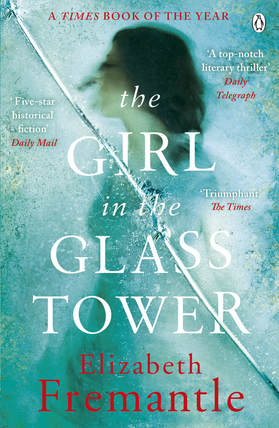THE GIRL IN THE GLASS TOWER – A Times Book of the Year
|
Tap. Tap. Tap on the window.
Something, someone wanting to be heard. Waiting to be free. Tudor England. The word treason is on everyone's lips. Arbella Stuart, niece to Mary Queen of Scots and presumed successor to Elizabeth I, has spent her youth behind the towering windows of Hardwick Hall. Her isolation should mean protection – but those close to the crown are never safe. Aemilia Lanyer – writer and poetess – enjoys an independence denied to Arbella. Their paths should never cross. But when Arbella enlists Aemilia's help in a bid for freedom, she risks more than her own future. Ensnared in another woman's desperate schemes , Aemilia must tread carefully or share her terrible fate... The Girl in the Glass Tower brilliantly explores what it means to be born a woman in a man's world, where destiny is strictly controlled and the smallest choices may save – or destroy – us. |
A feat of literary legerdemain...a top-notch literary thriller (The Telegraph) • Filled with dense, dark political and social intrigue, this is five-star historical fiction (Daily Mail) • If you read one Tudor tome this summer, make it this one. Fremantle is triumphant Fascinating and vividly drawn, the ending is heartbreaking (The Times 'Book of the Month) • Beautifully written completely engrossing and a book that stays after the pages are closed (Historia) • Arbella Stuart was a pawn, at the mercy of the powerful people around her. Hers is a sad and moving tale, and Fremantle tells it beautifully (History Girls)
About Arbella Stuart:

Through her great grandmother Margaret Tudor, Arbella Stuart had a strong claim to the English crown and was raised in the belief that she would be the heir of Elizabeth I.
For fear of kidnapping plots she spent much of her youth cloistered away at the magnificent Hardwick Hall in Derbyshire under the strict rule of her grandmother Bess of Hardwick, awaiting the moment when she would become Queen.
However the final years of Elizabeth's reign were turbulent, the political climate changed irrevocably and it was her Scottish cousin James who eventually succeeded, with the help of Elizabeth's powerful minister sir Robert Cecil, leaving Arbella in political limbo.
As with Lady Katherine Grey of Sisters of Treason, Arbella's royal blood made her either a valuable bargaining chip on the marriage market or a dangerous pretender to the throne. But Arbella refused to be held a fugitive at her cousin's court and made a courageous bid for freedom at great personal cost.
A remarkable, highly intelligent and complex woman, yet headstrong and deeply flawed, Arbella with her poignant and profound desire for freedom, fascinated me from the moment I first read about her. She was a prolific letter writer so it was easy to engage with her authentic voice and thereby build a sense of how she might become a character in my novel.
I have woven her story through with that of Aemilia Lanyer an Elizabethan poet, to give it another dimension. Lanyer's great, groundbreaking, project was in defence of misunderstood woman and as such Arbella was an archetype, and one of Lanyer's poems is addressed to her, so it seemed apt to tell their stories together.
Elizabeth Fremantle
For fear of kidnapping plots she spent much of her youth cloistered away at the magnificent Hardwick Hall in Derbyshire under the strict rule of her grandmother Bess of Hardwick, awaiting the moment when she would become Queen.
However the final years of Elizabeth's reign were turbulent, the political climate changed irrevocably and it was her Scottish cousin James who eventually succeeded, with the help of Elizabeth's powerful minister sir Robert Cecil, leaving Arbella in political limbo.
As with Lady Katherine Grey of Sisters of Treason, Arbella's royal blood made her either a valuable bargaining chip on the marriage market or a dangerous pretender to the throne. But Arbella refused to be held a fugitive at her cousin's court and made a courageous bid for freedom at great personal cost.
A remarkable, highly intelligent and complex woman, yet headstrong and deeply flawed, Arbella with her poignant and profound desire for freedom, fascinated me from the moment I first read about her. She was a prolific letter writer so it was easy to engage with her authentic voice and thereby build a sense of how she might become a character in my novel.
I have woven her story through with that of Aemilia Lanyer an Elizabethan poet, to give it another dimension. Lanyer's great, groundbreaking, project was in defence of misunderstood woman and as such Arbella was an archetype, and one of Lanyer's poems is addressed to her, so it seemed apt to tell their stories together.
Elizabeth Fremantle

